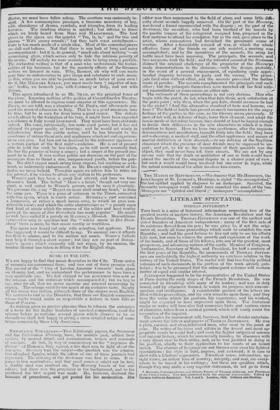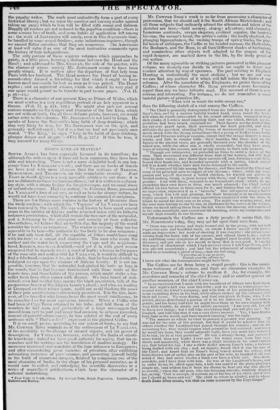THOMAS JEFFERSON.*
LITERARY SPECTATOR.
THIS book is a mine of historical information respecting two of the greatest events of modern history, the American Revolution and the French Revolution. THOMAS JEFFERSON was one of the earliest and ablest founders of American independence : many of the first acts of
its existence flowed from his pen ; he was privy to, if not the origi- nator of, nearly all those proceedings which went to establish the new Republic ; and had the good fortune to live not only to see his efforts take root, but even to witness the growth and expansion of the work of his hands, and of those of his fellows, into one of the greatest, most take root, but even to witness the growth and expansion of the work of his hands, and of those of his fellows, into one of the greatest, most prosperous, and advancing nations of the earth. Member of Congress, Ambassador, Secretary of State, and President, for half a century of the first years of the Republic, the memoranda of THOMAS JEFFER- SON are undoubtedly the highest authority we can have relative to the history of the United States. The reader will find two thickly printed volumes of such documents in the portion of the work already pub- lished ; it is to be presumed that the subsequent volumes will contain matter of equal and similar interest. JEFFERSON happened to be the representative of the United States at Paris during the early stages of the French Revolution. He was connected in friendship with many of its leaders ; and was in duty bound, and by character formed, to watch its progress wit in circum- spection and intelligence. A considerable portion of his letters are filled with its proceedings, and his own remarks upon them; and they have the value wide!' his position, his experience, and his wisdom, might be expected to have impressed upon them. The historical reader or writer will here also find numerous hints and various views of character, taken from a neutral ground, which will vastly assist the researches of the inquirer. The reader for amusement will, however, find but slender entertain- ment among the letters and papers of THOMAS JEFFERSON. He was a plain, earnest, and straightforward man, who went to the point at once. He writes of business and affairs in the fewest and most ap- propriate words he could find ; and even the lighter subjects of science and natural history, which he occasionally handles, he discusses with a very direct view to their utility, and, as he was justified in doing in his position, chiefly to their application to the wants of an infant nation. The charms of language are not thrown over even his lightest speculations : his style is bald, impure, and awkward; it is rare to meet with a felicitous expression. Excellent sense, information, up- right views, an ardent love of country, integrity, and zeal, are every- where to be traced in his writings ; but these are qualities which, though they may make a very superior statesman, do not go to form * Memoirs, Correspondence, and Private Papers of Thomas Jefferson, late Presidena
of the United States. Nosy first published from the original manuscripts. Edited by
Thomas Jefferson Randolph. Vol. 1 and 2. London, Colburu and Bentley.
the popular writer. The work must undoubtedly form a part of every historical library ; but we warn the careless and cursory reader against taking alp pages which to him will be filled with ennui and dulness. Happily all readers are not reduced to the papillon condition—there is Some serious love of truth, and some habits of application left among us : the work of JEFFERSON will surely, even in this degenerate time, be handled by some sound thinkers, some industrious inquirers, though we cannot flatter ourselves that they are numerous. The Americans at least will value it as one of the most instructive comments upon the history of their independence. The only portion of these copious volumes which approaches to gaiety, is a little piece, forming a dialogue between the Head and the Heart ; and addressed to Mrs. CosWAY, the wife of the painter, with the charms of whose society Mr. JEFFERSON seems to have been greatly struck. It is written after the departure of that lady from Paris with her husband. The Iliad accuses the Heart of having in- considerately formed a friendship for that which it ought to have known must necessarily be lost as soon as it was prized. The Heart replies ; and an argument ensues, which we should be very glad if our space would permit us to transfer in part to our pages. (Vol. II. p. 46-54.) There is a character of our present King as Prince of Wales, which we must confess is a very republican portrait of an heir apparent to a throne. (Vol. Il. p. 421, 422.) We might also pick out several curious remarks on the temper and character of the late King, which are not without truth. On all these delicate points, however, we would rather refer to the volumes. Mr. JEFFERSON is not kind to kings. He speaks of Lotus the Sixteenth's long habit of deep drinking ; which may very likely be true, for Mr. JEFFERSON was on the spot, and generally well-informed ; but it is a flictave had not previously seen stated. " The King," he says, " long in the habit of deep drinking, plunges deeper and deeper."—(Vol. II, p. '227.) If this be true, it may account for many things.



















 Previous page
Previous page